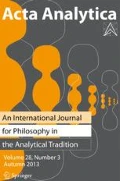Abstract
In this paper, I present, generalize and develop the extensionalist theory of rigidity for general terms in light of criteria commonly applied to theories of general term rigidity. According to the theory, a general term is rigid if its extension is constant across all possible worlds. This position has been widely dismissed because it conflicts with the seemingly straightforward idea that natural kind terms have varying extensions from world to world. This criticism holds only to the extent that natural kind terms are indeed rigid. If it turns out that we need not view them as rigid, then the extensionalist theory fares well when compared with other theoretical requirements.
Similar content being viewed by others
Notes
By “objects” I mean not only individuals but also truth values, numbers, sets of objects of different kinds, possible intensions, hyperintensions, and so on.
There are different views on this, however. Devitt (2005), for example, proposes a theory according to which general terms are not designators but appliers.
We can look at constants as nullary functions. For the purposes of this paper, I treat hyperintensions as constants.
Zouhar in (2015) discusses whether mathematical terms are designators.
I do not use the temporal parameter in this paper for the sake of simplicity. All of its results can easily be generalized.
I am aware that this is not a formalization for certain widely used terms of natural language. The example is meant to examine the possibilities of the language. The example uses the model of quantifiers presented and defined in Duží et al. 2010 p. 49).
The characterization of de jure rigidity as rigidity based on solely semantic properties of the term is illuminating (see LaPorte’s book (2013), 139–140) as well as the references he uses to support the claim that compositionality does not contradict de jure rigidity. I found Almog’s paper (1986), 223 ff.) to be especially helpful in this regard. Therefore, I think we should distinguish between linguistic de jure rigidity and semantic de jure rigidity. A term is linguistically de jure rigid if it has a constant extension assigned solely by stipulation. I would therefore consider proper names to be examples of linguistically de jure rigid terms. Further, a term is semantically de jure rigid if it has a constant extension as a result of its semantic properties – e.g., LaPorte’s example ‘the thing Socrates’ has a constant extension (i.e. Socrates) in all possible worlds (with respect to which it has an extension). This is an interesting idea, to be sure, but I do not want to pursue it further in this paper. I do not think that a general term can be linguistically de jure rigid. In other words, it seems to me that we cannot properly name a group of things, although I do not have an argument to substantiate this position at the moment. Surely, not all general terms have constant extensions. Therefore, not all of them are rigid. But it seems to me to be an open question whether we can consider natural kind terms semantically de jure rigid general terms.
The intuition that something that is a table in this world need not be a table in some other world (e.g. it remains a tree there) could be taken by some to suffice as an argument for the existence of simple general terms without constant extensions.
References
Almog, J. (1986). Naming without necessity. The Journal of Philosophy, 83(4), 210–242.
Devitt, M. (2005). Rigid application. Philosophical Studies, 125(2), 139–165.
Duží, M., Jespersen, B., & Materna, P. (2010). Procedural semantics for hyperintensional logic: foundations and applications of transparent intensional logic. Berlin: Springer.
Glüer, K., & Pagin, P. (2012). General terms and relational modality. Noûs, 46(1), 159–199.
Gómez-Torrente, M. (2006). Rigidity and essentiality. Mind, 115(458), 227–259.
Haraldsen, F. (2017). Rigidity and triviality. Synthese. https://doi.org/10.1007/s11229-016-1311-x.
Haukioja, J. (2006). Proto-rigidity. Synthese. https://doi.org/10.1007/s11229-004-6263-x.
Haukioja, J. (2012). Rigidity and actuality-dependence. Philosophical Studies, 157(3), 399–410.
Inan, I. (2008). Rigid general terms and essential predicates. Philosophical Studies, 140(2), 213–228.
Kripke, S. (1972). Naming and necessity. Cambridge: Harvard University Press.
Laporte, J. (2000). Rigidity and kind. Philosophical Studies, 97(3), 293–316.
LaPorte, J. (2013). Rigid designation and theoretical identities. Oxford: Oxford University Press.
Linsky, B. (2006). General terms as rigid designators. Philosophical Studies, 128(3), 655–667.
Macbeth, D. (1995). Names, natural kinds terms, and rigid designation. Philosophical Studies, 79(3), 259–281.
Marti, G. (2004). Rigidity and general terms. Proceedings of the Aristotelian Society, 104(1), 131–148.
Putnam, H. (1975). The meaning of ‘meaning’. In H. Putnam (Ed.), Mind, language, and reality: philosophical papers, (vol. 2, pp. 215–271). Cambridge: Campbridge University Press.
de Sa López, D. (2008). The over-generalization problem: predicates rigidly signifying “unnatural”. Synthese, 163(2), 263–272.
Schwartz, S. P. (2002). Kinds, general terms, and rigidity: A reply to Laporte. Philosophical Studies, 109(3), 265–277.
Soames, S. (2002). Beyond rigidity: The unfinished semantic agenda of naming and necessity. Oxford: Oxford University Press.
Soames, S. (2006). Reply to critics. Philosophical Studies, 128(3), 711–738.
Zouhar, M. (2009). On the notion of rigidity for general terms. Grazer Philosophische Studien, 78(1), 207–229.
Zouhar, M. (2012). On a broader notion of rigidity. Kriterion. Journal of Philosophy, 26(1), 11–21.
Zouhar, M. (2015). A puzzle about rigid designation. Organon F (Supplementary Issue), 22, 96–117.
Author information
Authors and Affiliations
Corresponding author
Rights and permissions
About this article
Cite this article
Kosterec, M. Criteria for Nontrivial General Term Rigidity. Acta Anal 33, 255–270 (2018). https://doi.org/10.1007/s12136-017-0334-3
Received:
Accepted:
Published:
Issue Date:
DOI: https://doi.org/10.1007/s12136-017-0334-3


